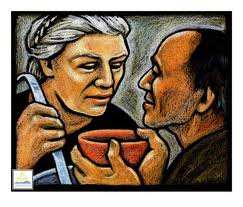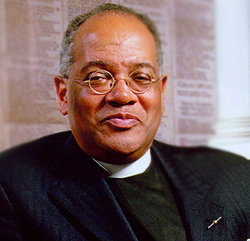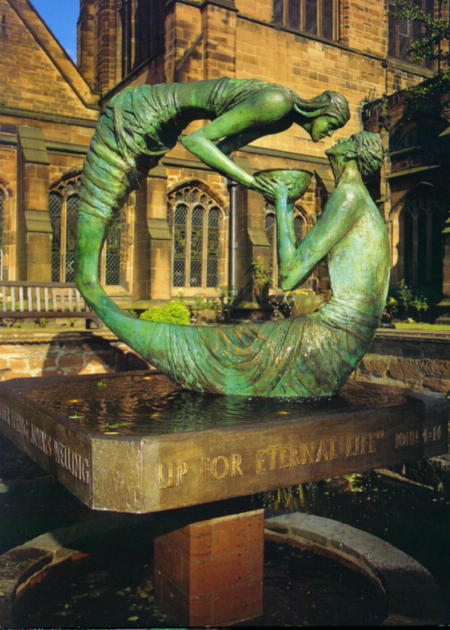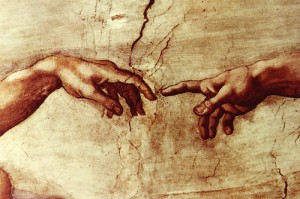Matthew 26:14- 27:66
In the past two weeks, I have received news of the deaths of two men who were beloved to me, news that shocked me and caused tears to form immediately in my eyes and in my heart.
One friend was the priest who raised me up to priesthood, who in his sometimes gentle and sometimes gruff ways formed me to be the person and priest I am today. Last Sunday morning, I served at the church where he celebrated for more than two decades, and for the first time I was privileged to sing the Eucharist at the table where he taught me so much. As I sang, I thought of Bob, and I smiled, and later told others, “Now I know why he loved to sing at that table so much – it’s holy.” By the time I finished singing the Eucharist, unbeknownst to me, Bob was in the hospital, having suffered a heart attack.
Three days later, he was dead.
The other man was a friend who had counseled me through some tough times, advised me through some marvelous times, and who could talk baseball with the best of them. Russ had served as the chancellor of the Diocese of Virginia for more than two decades and was beloved by all in that diocese. Whenever we met, he would stop whatever he was doing, turn his full attention to me, bestow that marvelous Southern gentleman smile upon me, and wrap me a hug. He had cataract surgery two Tuesday mornings ago.
At home, resting up afterwards, he suddenly died.
I’ve spent a lot of time thinking about Bob and Russ since they died. I know who they were in my life, but as I grieve their loss, I am left to wonder who I was in their lives.
This, my friends, is an important question for all of us to contemplate, this question of who we are. Who are we in each other’s lives, in God’s life, in Jesus’ life?
It is an especially important question to ask today, on the Sunday of the Passion: Palm Sunday, as we move from exultation to devastation, from life to death.
Who are we – who exactly are we – in this Holy Week?
Take a moment and consider:
Who are you in this Holy Week? …
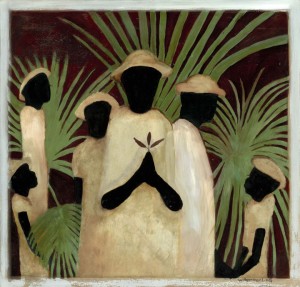 Are you one of the people cheering Jesus on as he rides into Jerusalem, waving palms and throwing your cloak on the ground, pinning all your hopes on this man, proclaiming him the Messiah?
Are you one of the people cheering Jesus on as he rides into Jerusalem, waving palms and throwing your cloak on the ground, pinning all your hopes on this man, proclaiming him the Messiah?
Is that who you are?
Or are you one of those in the crowd five days later, caught up in the bloodlust, screaming in a frenzy, “Crucify him! Crucify him!”?
Who are you in this Holy Week?
Are you Judas, a faithful disciple – and make no mistake, he was faithful. Jesus called him, Judas followed, and Judas was with Jesus for a substantial portion of his ministry. Judas was there for the miracles and the healings, the preaching and teaching, on the road and in the Temple. He was present at the Last Supper. And then … he betrayed Jesus … because Judas’ vision of the Messiah blinded him to the vision of the Messiah.
Judas wanted a Messiah all right … but Jesus wasn’t the Messiah Judas wanted.
Is that who you are?
Or are you Simon, now called Peter, the Rock, who like Judas followed Jesus when Jesus came calling, who like Judas sat at table with Jesus and broke bread with him, who like Judas was in the synagogues and on the street, who just like Judas failed Jesus at the most critical moment, and who just like Judas betrayed the Lord …?
Is that who you are?
Perhaps you are Caiaphas, the High Priest, threatened by this upstart, ragged, itinerant preacher, worried that if he continues to preach this scandalous gospel of his, your people might die as a result?
Or maybe you are Pontius Pilate, who is already having a hard time controlling these stubborn Jews who refuse to honor Caesar (for God’s sake, couldn’t they just go along to get along?), worried that if you don’t do something with yet another so-called Messiah, if you don’t satisfy this bloodthirsty crowd, you will lose both your job and your head?
Is that who are you in this Holy Week?
Are you Barabbas, the murderous zealot already condemned to death and suddenly set free, asking no questions, but taking your freedom and running for the hills?
Or are you Simon of Cyrene, the man who came to town to sell merchandise for the high holy days and who suddenly is dragged into this drama and forced to help this man you’ve never met, about whom you know nothing?
Perhaps you are one of the disciples, so committed to the Lord that you gave up everything to follow him everywhere – except to the cross?
Or are you one of the women, risking your very life to stand at the foot of the cross, knowing that Roman law said you, too, could be executed for the crime of simply knowing Jesus?
Maybe that’s who you are!
Maybe you’re one of the thieves crucified with Jesus, one on his right and one on his left, mocking him to the end, because in the end, all three of you are going to die anyway, and you might just as well get in your licks while you can, right?
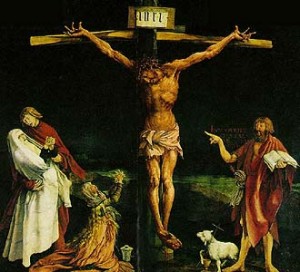 Or are you one of the Roman soldiers who beat, taunted and crucified yet another unruly Palestinian causing trouble, not caring about who this man is because you are just following orders?
Or are you one of the Roman soldiers who beat, taunted and crucified yet another unruly Palestinian causing trouble, not caring about who this man is because you are just following orders?
Are you possibly one of the people in the crowd – a chief priest or a scribe or an elder – taunting Jesus because he refuses to save himself, even though he saved so many others?
Is that who you are?
Are you the Roman Centurion and his cohort, feeling the earth move and seeing the rocks split and the tombs come open, and in great terror proclaiming at the last, “Truly this man was God’s Son!”
Or are you Joseph of Arimathea, helping to take down the body of your beloved Jesus, and laying him your own tomb, wracked with grief because all your hopes have come to an end?
Who are you in this Holy Week?
….
On this Sunday of the Passion: Palm Sunday, in this sacred week of our lives, I can tell you who you are. I can tell you who we are.
Each of us, at some point in our lives, is every single one of the players just named in this incredible drama.
At some point in each of our lives, we have rejoiced and shouted the praises of the Lord: Hosanna in the highest! And at some other point, we have rejected God … or wondered where God was … or cursed God … or betrayed God …
At some point in our lives, we’ve all put our families, our wants, our needs, our desires, our dreams ahead of God. We’ve made God wait and we have presumed to tell God that God is wrong …
The good news is, those given moments? They are not God’s final answer to our question.
Because God’s final answer is this:
We are beloved children of God.
We can be faithful stalwarts one moment and falling-down failures the next, but it won’t change the essence of who we are, the core of our being.
We are God’s beloved.
And God loves us so much … so much … that God not only sent his only begotten son to live with us, God sent his only begotten son to die for us. For each of us. For all of us. That’s God’s final answer to our question of who are we in this Holy Week.
My two friends, who died so recently, Bob and Russ?
They taught me a lot of things. They taught me that I wasn’t always perfect, that I didn’t always do just the right thing, that there were days when I fell down and days when my friendship faltered – but because they loved me, they never gave up on me. They never abandoned me.
The same is true with God, and this week, this Holy week, is the week when God teaches us the same thing.
We will not always be perfect – even the disciples weren’t.
We will not always do the right thing – even the disciples didn’t.
We will fall down – like Caiaphas and Pilate.
We will falter in our faith – like Peter and the frenzied crowds.
But God does not give up on us. God does not abandon us just because we have failed in some way, great or small.
As you try to figure out who you are in this holiest and most important week of your life, remember the lesson that my two friends taught me.
Remember that no matter what role you play – that of faithful follower or brave witness or even miserable betrayer –
Remember:
God already knows the answer to our question:
We are God’s beloved.
Amen.
A sermon preached at St. Paul’s Cathedral in Syracuse, N.Y., on the Sunday of the Passion: Palm Sunday.






